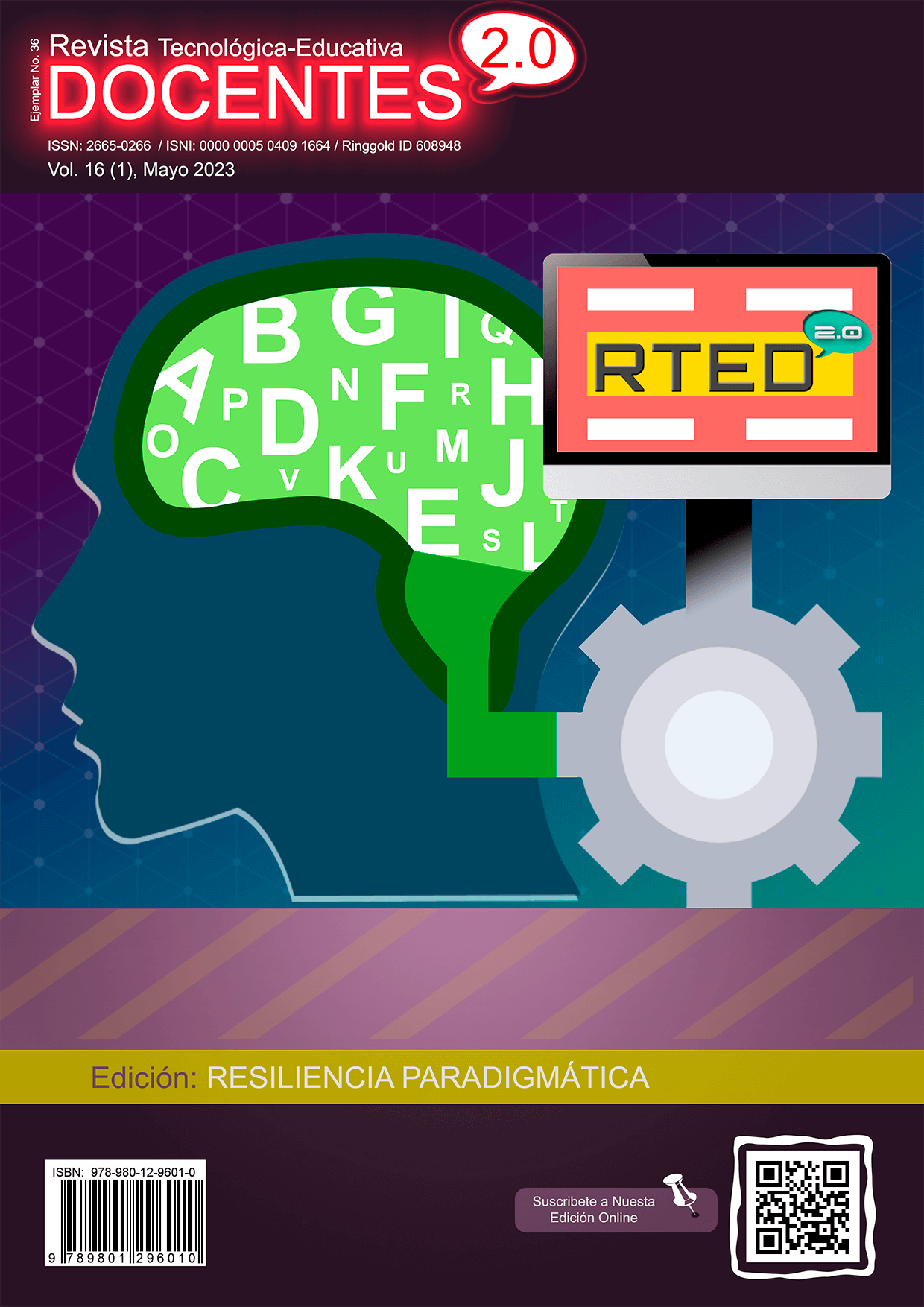Inconsistencies between Knowledge and Environmental Practice: A Reflection from Environmental Epistemology
 DOI:
https://doi.org/10.37843/rted.v16i1.366
DOI:
https://doi.org/10.37843/rted.v16i1.366
Main Article Content
Abstract
Caring for the environment is of the utmost importance for humanity, and through environmental education, learning processes have been implemented in the search for sustainable development. This essay is framed under the inductive method in the humanist paradigm, with a qualitative approach of an interpretative type and with a topical narrative design. It critically reflects on the inconsistency between the environmental knowledge acquired through environmental education processes and the daily praxis of the holders of knowledge. Environmental discourses have not transcended beyond simple theories since, in daily life, bad social and individual environmental habits are evident, generating doubts about the practical application of the knowledge acquired. Based on the postulates of environmental epistemology proposed by Leff and analyzing various investigations on environmental education, sustainable development, and its real practices in different contexts, conclusions are reached about the need to understand nature beyond a simple physical place. There are epistemic strategies that take environmental education and sustainable development as basic tools to achieve praxis and thus demonstrate the knowledge apprehended by students, which must be reflected in their behaviors or habits in their daily life.
Downloads
Metrics
Article Details

This work is licensed under a Creative Commons Attribution-NonCommercial-NoDerivatives 4.0 International License.
Those authors who have publications in our journal accept the following terms:
- When a work is accepted for publication, the author retains rights of reproduction, distribution of his/her article for exploitation in all countries of the world in the format provided by our magazine and any other magnetic medium, optical, and digital.
- Authors will retain their copyright and guarantee the journal the right first to publish their work, which will be simultaneously subject to the Creative Commons Acknowledgment License (Attribution-NonCommercial-NoDerivatives 4.0 International (CC BY-NC-ND 4.0)). That allows third parties to copy and redistribute the material in any medium or format, under the following conditions: Acknowledgment - You must properly acknowledge authorship, provide a link to the license, and indicate if any changes have been made. You may do so in any reasonable way, but not in a way that suggests you have the licensor's endorsement or receive it for your use. NonCommercial - You may not use the material for a commercial purpose. NoDerivatives - If you remix, transform, or build from the material, you cannot broadcast the modified material. There are no additional restrictions - You cannot apply legal terms or technological measures that legally restrict you from doing what the license allows.
- Authors may adopt other non-exclusive license agreements to distribute the published version of the work (e.g., deposit it in an institutional archive or publish it in a monographic volume) provided that the initial publication in this journal is indicated.
- Authors are allowed and recommended to disseminate their work through the Internet (e.g., in institutional telematic archives, repositories, libraries, or their website), producing exciting exchanges and increasing the published work's citations.
- Request of withdrawal an article has to be done in writing by the author to the Editor, becoming effective after a written response from the Editor. For this purpose, the author or authors will send correspondence via e-mail: [email protected].
- The author will not receive financial compensation for the publication of his work.
- All Docentes 2.0 Journal publications are under the Open Journal System (OJS) platform at: https://ojs.docentes20.com/.
References
Arana, A. (2007). Respetando la complejidad ambiental: dos estudios de caso. Investigación y Postgrado, 22(1), 13-58. http://ve.scielo.org/scielo.php?script=sci_arttext&pid=S1316-00872007000100002&lng=es&tlng=es.
Castillo, Y. (2017). Hacia un contractualismo ecocentrista. Gestión y Ambiente 20(1), 105-112. Dialnet-HaciaUnContractualismoEcocentrista-6687492.pdf DOI: https://doi.org/10.15446/ga.v20n1.64100
Finol, W. (2019). Consideraciones epistemológicas del saber ambiental. Revista de Ciencias Sociales. XXV (2). https://www.redalyc.org/articulo.oa?id=28059953016 DOI: https://doi.org/10.31876/rcs.v25i2.27348
Gasper, D. (2012). Interdisciplinariedad hacia una ecología compleja de las ideas. Revista del Doctorado Interinstitucional en Ciencias Ambientales. Ambiente y Sostenibilidad. https://bibliotecadigital.univalle.edu.co/bitstream/handle/10893/8256/interdisiplinariedad.pdf?sequence=1&isAllowed=y DOI: https://doi.org/10.25100/ays.v2i1.4323
Hernández-Sampieri, R., Fernández-Collado, C., & Baptista-Lucio, P. (2014). Metodología de la investigación (6a. ed.). McGraw-Hill.
Leff, E. (1986). Ecología y capital: hacia una perspectiva ambiental del desarrollo. UNAM. https://www.researchgate.net/publication/327904620
Leff, E. (1998). La capitalización de la naturaleza y las estrategias fatales de la sustentabilidad, en Saber ambiental: sustentabilidad, racionalidad, complejidad, poder. PNUMA/UNAM/Siglo XXI Editores.
Leff, E. (2002). Hacia una pedagogía de la complejidad ambiental. Uni-Pluri/versidad. 2(1). Universidad de Antioquia. https://revistas.udea.edu.co/index.php/unip/article/view/12394
Leff, E. (2006). Aventuras de la Epistemología Ambiental: de la articulación de ciencias al diálogo de saberes. Siglo XXI Editores. http://www.ceapedi.com.ar/imagenes/biblioteca/libreria/299.pdf
Leff, E. (2011). Cambio climático y sustentabilidad: naturaleza, ruralidad y turismo en la construcción de una sociedad sustentable. Memorias del Seminario Internacional “Las vías del desarrollo sustentable en el medio rural: naturaleza, sociedad rural y turismo en América Latina”, UNAM.
Lévinas, (2001). La realidad y su sombra: Libertad y mandato, trascendencia y altura. Editorial Trotta.
Maceri, S. (2019). ¿Qué significa ser racional?: sobre el concepto epistemológico de la racionalidad crítica. Memoria Académica II Congreso Internacional de Investigación. Argentina. http://www.memoria.fahce.unlp.edu.ar/trab_eventos/ev.12028/ev.12028.pdf
Márquez, I. (2011). Cultura Ambiental en estudiantes de bachillerato. Revista Electrónica de Investigación Educativa, 13 (2). Universidad Autónoma Baja California. http://www.redalyc.org/articulo.oa?id=15520598006
Navarro, R. (2006). Construyendo el significado del cuidado ambiental: un estudio de caso en educación secundaria. Revista Electrónica Iberoamericana sobre Calidad, Eficacia y Cambio en Educación. 4 (1). http://www.redalyc.org/articulo.oa?id=55140106
Rendueles, M. (2007). La dualidad sujeto-objeto y la responsabilidad social empresarial. Telos, 9(1). https://www.redalyc.org/articulo.oa?id=99314566008






